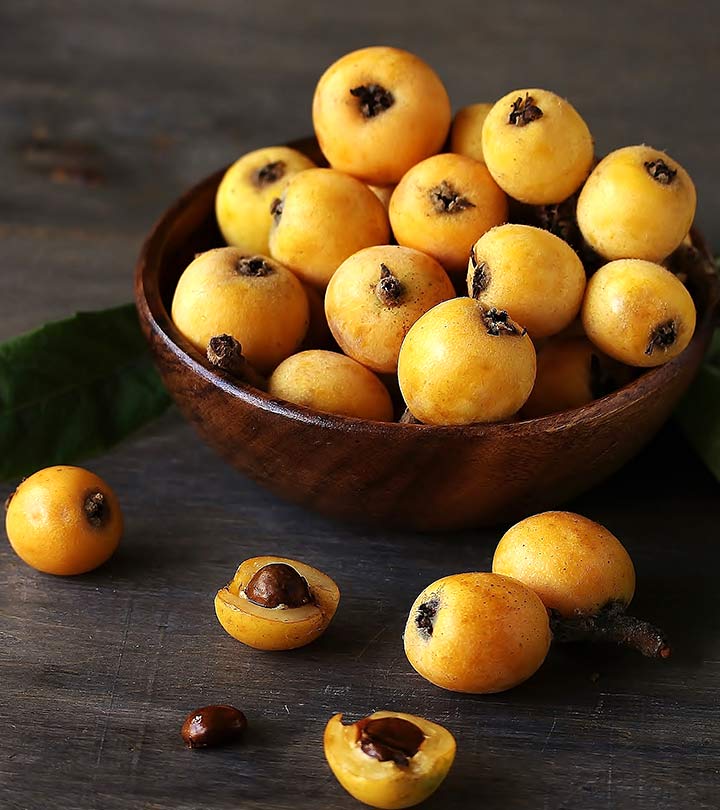Several loquat benefits may persuade you to eat this exotic fruit. Loquats (Eriobotrya japonica) are native to China and are packed with antioxidants, flavonoids, and essential nutrients.
Loquats (also called Chinese plums) have a round or pear-shaped body and yellow skin. Their flavor is similar to apricots and cherries. This fruit is commonly consumed raw and processed into jams, jellies, and juices.
Loquat leaves, seeds, and fruit have a wide range of medicinal properties. Evidence suggests that loquats may contribute to heart health, reduce cancer risk, and prevent diabetes. They may also help reduce neurological stress, inflammation, and lower blood cholesterol levels.
This article discusses the benefits of loquats, their nutritional profile, and any potential side effects. Keep reading.
In This Article
What Are The Benefits Of Loquat Fruit?
1. Promotes Heart Health
Loquat is rich in potassium. The mineral acts as a vasodilator and reduces strain on the blood vessels (1). Potassium may also lower the blood pressure and protect the heart (2). The magnesium in the fruit is also essential for regulating blood pressure and boosting cardiac function (3).
The phenolic compounds in loquats may prevent cellular damage and reduce inflammation, thus improving heart health (4), (5). They exhibit antioxidant properties that may help reduce the risk of cardiovascular diseases.
Studies have also found that foods rich in antioxidant effects may reduce the risk of heart disease (6), (7). Carotenoid concentrations in foods also reduce the risk of several heart problems (8).
Related: 15 Simple & Natural Ways To Lower Your Blood Pressure At Home
2. May Reduce The Risk Of Cancer
Animal studies state that extracts of leaves and seeds of loquat possess anti-cancer properties (9), (10). Methanol extracts of loquat were found to help prevent the spread of human breast cancer cells (11).
A study conducted by Okayama University found that polyphenols showed cytotoxic activityi XA process or the ability of a substance to damage or eliminate living cells, including cancer cells. against human oral tumor cell lines (12). Loquats contain chlorogenic acid that may suppress cancer growth (9), (13). The acid prevents the spread of human colon cancer cells and leads to their death (14).
Loquats contain beta-carotene. A study conducted by the Zhengzhou University found that beta-carotene might have anti-tumor effects (15).
3. Helps Treat Diabetes
Shutterstock
Research shows that the extracts of loquat leaves and seeds may have an anti-diabetic activity. They may help in the control and prevention of type 1 and 2 diabetes (9). In a study conducted by the Central Taiwan University of Science and Technology on mice, loquat could lower blood sugar levels (16).
Another study conducted by the Siebold University of Nagasaki on rats and mice found that loquat seeds exhibited hypoglycemic activityi XA state that develops when blood sugar drops below normal and reaches a potentially dangerous level. (17).
Related: 15 Herbs For Diabetes That Keep Your Sugar Levels In Control
4. May Offer Anti-Inflammatory Properties
Loquats possess anti-inflammatory properties. Diseases such as cardiovascular and neurodegenerative disordersi X A group of conditions caused by progressive death of the nerve cells and affect brain functions. are associated with inflammation (18), (19). Loquat juice was found to have preventive effects on inflammation (20).
In mice studies, fruit extracts of loquats were found to reduce inflammation caused by a high-fructose diet (21). More long-term research is needed to understand the effects of loquat on inflammation.
5. May Reduce Blood Cholesterol Levels
Loquat contains pectin, a type of fibre that may lower cholesterol levels. A study conducted by Maastricht University found that pectin reduces total cholesterol concentrations in humans (22). However, limited research is available in this regard.
6. May Reduce Memory Impairment And Neurological Stress
Shutterstock
Loquat extracts reduce memory impairment and help prevent neurological stress. The carotenoid antioxidants in loquat combat the oxidative stress caused by free radicals. A study conducted by the Yonsei University College of Medicine found that loquat had neuroprotective effects. The fruit may act against memory impairment and oxidative stress (23).
7. Aids Digestion
The leaves of loquat are traditionally used for soothing the digestive system (24). The pectin in loquat can act as a digestive aid. A study conducted by the Shiga University of Medical Science on rats found that pectin might increase the amount of intestinal mucosa (25), (26). Dietary fiber can stimulate peristaltic motion (wave-like contractions) and promote regularity of bowel movements.
StyleCraze TriviaThere are more than 800 varieties of loquats available around the world, and China is the world’s leading producer of loquats.
In the following section, we have extensively covered the nutritional profile of loquat.
Related: 14 Home Remedies For Digestive Problems And Prevention Tips
Loquat Nutrition Facts
iStock
Loquat is an excellent source of vitamins, minerals, and carbohydrates. It also contains monounsaturated fats like omega-3 and omega-6 fatty acids. The fruit is also low in cholesterol and calories as it hardly contains any lipids. According to the United States Department of Agriculture, one cup (149 grams) of loquats contains (27):
- Energy: 70 kcal
- Protein: 0.641 g
- Carbohydrate: 18 g
- Fiber: 2.53 g
- Calcium: 23.8 mg
- Folate: 20.9 mg
Additionally, loquats contain small amounts of vitamin B1, vitamin C, vitamin A, riboflavin, copper, iron, calcium, and phosphorus.
These promising benefits and nutrition facts of loquat may have left you wondering how to have it. Check out the next section to know more.
How To Eat Loquat
Shutterstock
You can consume the fruit in different ways. We have included a couple of simple recipes.
Loquat Tea
Ingredients
- 2 to 4 inch loquat leaves
- 2cups of water
Procedure
- Mince the leaves and combine them with the water.
- Bring the mixture to a boil. Reduce the heat and simmer for 15 minutes.
- Remove from the heat, cover, and let the tea steep for 10 minutes.
- Strain and serve hot, or allow to cool and serve iced.
Loquat Juice
- 10 loquats
- 1 glass of water
- 2 tablespoons of sugar
- 1 tablespoon of lemon juice
- A pinch of salt
- 1/4 teaspoon black salt (optional)
Procedure
- Peel the skin of loquats and discard the seeds. Add all the ingredients in a blender.
- Blend for a few minutes.
- Add ice and blend for a few more seconds.
- Serve immediately.
StyleCraze TriviaLoquats are also called Chinese or Japanese plums and are widely used for making wine. Its wood is used for making rulers and drawing tools.
Though loquat is generally safe for consumption, it does have a few side effects that you need to keep in mind. Check them out in the following section.
What Are The Side Effects Of Loquat?
Shutterstock
Excess consumption of loquat may cause toxic myopathy. Limited information is available to conclude if the fruit may have any other side effects.
Toxic Myopathy
In a study, a patient with hypertriglyceridemia (high levels of triglyceridesi XA type of fat circulating in the blood, and the body uses it as a primary source of energy. ) who had ingested 2 litres of loquat leaf tea in two weeks saw a remarkable decrease in triglyceride levels. However, he also experienced inflammatory myopathy (a muscle disease leading to muscle weakness) (28).
No other documented adverse effects have been identified yet.
Loquat’s benefits can be attributed to its antioxidants, flavonoidsi XA group of naturally occurring antioxidants in fruits and vegetables which protect the body from diseases. , and other beneficial nutrients. This exotic fruit can promote cardiovascular health, aid in digestion, and reduce cancer risk, memory impairment, and neurological stress. It also helps in managing diabetes and cholesterol levels. To reap its benefits, you can have the juice of the fruit directly, or the tea made with its leaves. However, excess consumption of loquat may trigger undesirable side effects like toxic myopathy. Hence, caution is advised.




